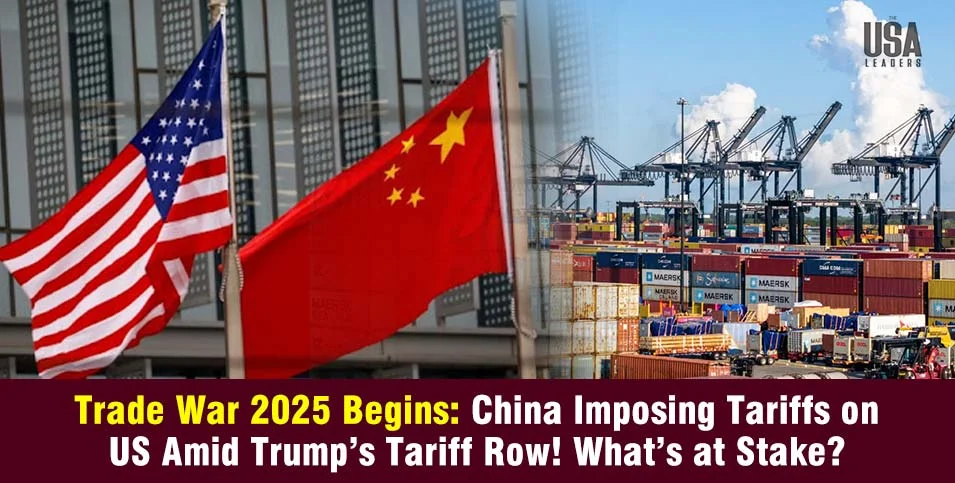
Explore the escalating U.S.-China trade war and its devastating impact on global markets, from tariffs and retaliations to rare earth export bans. Understand what’s at stake and what lies ahead.
Introduction
The trade war between the United States and China has entered a perilous new phase. What began as a series of tariff skirmishes has now snowballed into a full-blown economic standoff threatening global markets, supply chains, and political stability. The stakes are enormous: the world’s two largest economies are now engaged in a tit-for-tat battle, one that could reshape the global economic order.
In this blog, we will break down the key developments, examine their implications, and explore what the future might hold. From shocking market plunges to rare earth warfare, the battle lines are drawn. Let’s dive in.
Trump 2.0: What His Second Term Means for America and the WorldSection 1: The Tariff Timeline
The Escalation
- February 2025: U.S. imposes a 10% tariff on Chinese imports.
- March 2025: Another 10% added.
- April 2025: A staggering 34% increase announced.
- Threat of 50% More: President Trump hints at another 50%, effectively doubling the cost of Chinese goods.
Market Response for this Trade war
The reaction from global markets was immediate and brutal:
- Shanghai Composite Index fell over 7%, wiping out half a trillion USD in one day.
- Hong Kong’s Hang Seng Index dropped 13%, its worst plunge in almost three decades.
Section 2: China’s Retaliation Strategy
China initially responded with restraint:
- Targeted U.S. energy sectors like coal and LNG.
- Later expanded tariffs to agriculture, hitting chicken and beef imports.
But the game changed after the 34% U.S. tariff:

Reciprocal Tariffs
China responded with:
- An equivalent 34% tariff on U.S. goods.
- A firm stance: “We charge them less, but we still hit back.”
Rare Earths Weaponization
China escalated by targeting America’s supply chain choke points:
- Controls 90% of global rare earth supply.
- Restricted exports of vital elements like dysprosium, ytterbium, and terbium.
- Added seven new categories of rare earths to its export control regime.
See the U.S. Geological Survey’s report on rare earth dependence
These elements power:
- Electric vehicles (EVs)
- Fighter jets
- Night vision goggles
- Wind turbines
Strategic Implications
- American aerospace and tech industries at risk.
- Short-term stockpiles exist but are unsustainable.
- Export curbs seen as an effective embargo.
Section 3: The Bigger Picture – Why Tariffs Matter
The Trade Math
- U.S. exports to China: ~$140B
- U.S. imports from China: ~$440B
- Thus, tariffs on Chinese goods hurt more due to the trade imbalance.
The Narrative Battle
Trump’s rationale:
- China is “cheating” through unfair subsidies.
- The U.S. is reclaiming wealth and manufacturing.
But economists argue:
- Trade deficits are not inherently bad.
- They often reflect a wealthier nation consuming more.
Section 4: Political and Global Ramifications
Trump’s Threefold Tariff Purpose
- Revenue Generator: Taxes on importers raise government funds.
- Manufacturing Incentive: Push companies to bring jobs back.
- Negotiating Weapon: Leverage to extract concessions (e.g., TikTok divestment).
China’s Global Messaging
- Framing U.S. actions as economic bullying.
- Asserting tariffs violate WTO norms.
- Appealing to global sympathy and positioning as a victim.
The Diplomatic Fallout
- Both nations face a credibility crisis.
- Allies and trade partners caught in the crossfire.
- Multilateral trade systems under severe stress.
Section 5: What Lies Ahead
The Uncertain Future
With no clear resolution in sight, possibilities include:
- Total economic decoupling between U.S. and China.
- Continued escalation, disrupting global supply chains.
- Multilateral trade realignment, with countries seeking to reduce dependence.
Actionable Insights
- Businesses must diversify suppliers, particularly in tech and defense sectors.
- Investors should watch rare earth markets and emerging economies for volatility.
- Governments need contingency plans for strategic materials.
Conclusion: A Trade War With No Winners
This U.S.-China trade conflict is not just a dispute over tariffs; it’s a fundamental clash of economic philosophies and global dominance. As both sides dig in, the collateral damage is mounting, not just for their own economies but for the world at large.
Whether you’re a policymaker, business leader, or global citizen, understanding these dynamics is critical. What happens next could redefine the global economy for years to come.
Call to Action
Stay informed, stay agile. And don’t forget to share this article to help others understand the real stakes in this ongoing trade war.
Follow Globyte News for more updates on global markets, tech, and geopolitics.
The Trump Administration’s National Security Breach: What Happened and What It Means